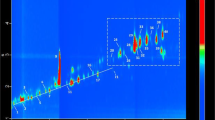Abstract.
Lipids exposed to oxygen at elevated temperatures undergo oxidative modifications, leading to the formation of a variety of products. These processes play an important role in frying and cooking, where oils with different contents of saturated and unsaturated fatty acids are used. All available analytical techniques used so far have considerable drawbacks, lack sufficient specificity and sensitivity or are laborious and time-consuming. In this study we used nuclear magnetic resonance spectroscopy (NMR) and matrix-assisted laser desorption and ionization time-of-flight (MALDI-TOF) mass spectrometry (MS) for the characterization of the effects of thermal stressing on selected vegetable oils (olive oil and linseed oil). Both methods applied provide fast and reliable information on oil composition as well as on the oxidation products formed upon heating. MALDI-TOF detects the changes most directly, whereas NMR provides more detailed information on products with lower molecular weights (e.g. aldehydes). Because of its rapid performance and especially its high sensitivity, MALDI-TOF MS represents a new and promising tool for lipid analysis.
Similar content being viewed by others
Author information
Authors and Affiliations
Additional information
Electronic Publication
Rights and permissions
About this article
Cite this article
Schiller, J., Süß, R., Petković, M. et al. Thermal stressing of unsaturated vegetable oils: effects analysed by MALDI-TOF mass spectrometry, 1H and 31P NMR spectroscopy. Eur Food Res Technol 215, 282–286 (2002). https://doi.org/10.1007/s00217-002-0555-5
Received:
Revised:
Issue Date:
DOI: https://doi.org/10.1007/s00217-002-0555-5




